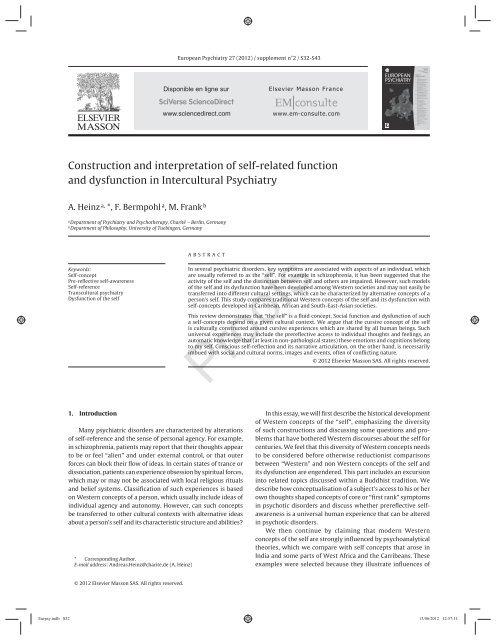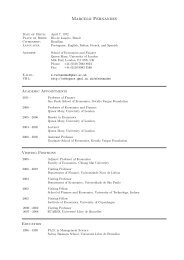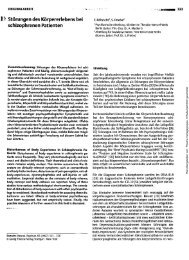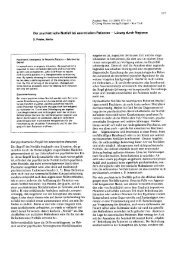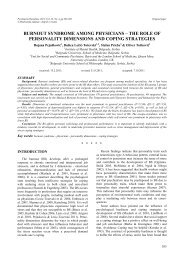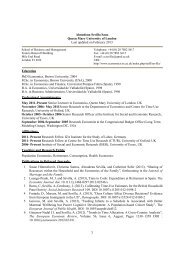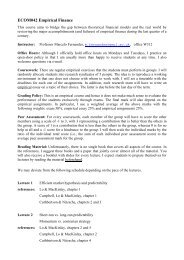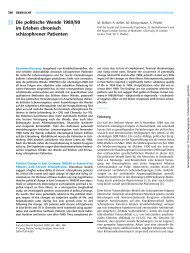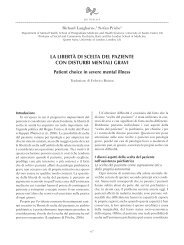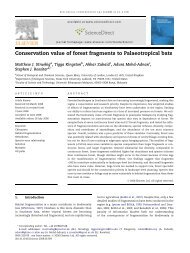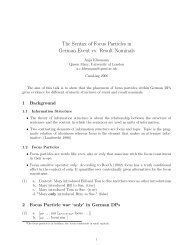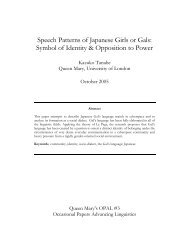Proofs - Personal Webspace for QMUL - Queen Mary, University of ...
Proofs - Personal Webspace for QMUL - Queen Mary, University of ...
Proofs - Personal Webspace for QMUL - Queen Mary, University of ...
You also want an ePaper? Increase the reach of your titles
YUMPU automatically turns print PDFs into web optimized ePapers that Google loves.
© 2012 Elsevier Masson SAS. All rights reserved.<br />
European Psychiatry 27 (2012) / supplement n°2 / S32-S43<br />
Construction and interpretation <strong>of</strong> self- related function<br />
and dysfunction in Intercultural Psychiatry<br />
A. Heinz a, *, F. Bermpohl a , M. Frank b<br />
a Department <strong>of</strong> Psychiatry and Psychotherapy, Charité – Berlin, Germany<br />
b Department <strong>of</strong> Philosophy, <strong>University</strong> <strong>of</strong> Tuebingen, Germany<br />
Keywords:<br />
Self- concept<br />
Pre- refl ective self- awareness<br />
Self- reference<br />
Transcultural psychiatry<br />
Dysfunction <strong>of</strong> the self<br />
1. Introduction<br />
ABSTRACT<br />
Many psychiatric disorders are characterized by alterations<br />
<strong>of</strong> self- reference and the sense <strong>of</strong> personal agency. For example,<br />
in schizophrenia, patients may report that their thoughts appear<br />
to be or feel “alien” and under external control, or that outer<br />
<strong>for</strong>ces can block their fl ow <strong>of</strong> ideas. In certain states <strong>of</strong> trance or<br />
dissociation, patients can experience obsession by spiritual <strong>for</strong>ces,<br />
which may or may not be associated with local religious rituals<br />
and belief systems. Classifi cation <strong>of</strong> such experiences is based<br />
on Western concepts <strong>of</strong> a person, which usually include ideas <strong>of</strong><br />
individual agency and autonomy. However, can such concepts<br />
be transferred to other cultural contexts with alternative ideas<br />
about a person’s self and its characteristic structure and abilities?<br />
* Corresponding Author.<br />
E-mail address: Andreas.Heinz@charite.de (A. Heinz)<br />
<strong>Pro<strong>of</strong>s</strong><br />
68767<br />
EUROPEAN<br />
PSYCHIATRY<br />
THE JOURNAL OF THE EUROPEAN PSYCHIATRIC ASSOCIATION<br />
ISSN 0924-9338<br />
June 2012<br />
Vol. 27 - Supplement n°2<br />
pp. S1-S81<br />
Migration<br />
and Mental Health<br />
S1 Editorial<br />
A. Heinz, U. Kluge<br />
S4 The willingness to participate in health research<br />
studies <strong>of</strong> individuals with Turkish migration<br />
backgrounds: barriers and resources<br />
D. Dingoyan, H. Schulz, M. Mösko<br />
S10 Socio-economic status and emotional distress<br />
<strong>of</strong> female Turkish immigrants and native<br />
German women living in Berlin<br />
MC. Aichberger, Z. Br omand, A. Heredia<br />
Montesinos, S. Temur-Erman, A. Mundt,<br />
A. Heinz, MA. Rapp, M. Schouler-Ocak<br />
S17 Mental health <strong>of</strong> Turkish women in Germany:<br />
resilience and risk factors<br />
Z. Bromand, S. Temur-Erman, R. Yesil,<br />
A. Heredia Montesinos, MC. Aichberger,<br />
D. Kleiber, M. Schouler-Ocak, A. Heinz,<br />
MC. Kastrup, MA. Rapp<br />
S22 The infl uence <strong>of</strong> stigma on depression, overall<br />
psychological distress, and somatization<br />
among female Turkish migrants<br />
A. Heredia Montesinos, MA. Rapp, S. T emur-<br />
Erman, A. Heinz, U. Hegerl, M. Schouler-Ocak<br />
S27 Translation and adaptation <strong>of</strong> the Zung<br />
Self-Rating Depression Scale <strong>for</strong> application<br />
in the bilingual Azerbaijani population<br />
F. Mammadova, M. Sultanov, A. Hajiyeva,<br />
M. Aichberger, A. Heinz<br />
S32 Construction and interpretation <strong>of</strong> self-related<br />
function and dysfunction in Intercultural<br />
Psychiatry<br />
A. Heinz, F. Bermpohl, M. Frank<br />
S44 Explanatory models and concepts<br />
<strong>of</strong> West African Malian patients<br />
with psychotic symptoms<br />
F. Napo, A. Heinz, A. Auckenthaler<br />
S50 How to express mental health problems:<br />
Turkish immigrants in Berlin compared<br />
to native Germans in Berlin<br />
and Turks in Istanbul<br />
A. Vardar, U. Kluge, S. P enka<br />
S56 Health services and the treatment<br />
<strong>of</strong> immigrants: data on service use, interpreting<br />
services and immigrant staff members<br />
in services across Europe<br />
U. Kluge, M. Bogic, W. Devillé, T. Greacen,<br />
M. Dauvrin, S. Dias, A. Gaddini, NK. Jensen,<br />
E. Ioannidi-Kapolou, R. Mertaniemi,<br />
R. P uipcinós i Riera, S. Sandhu, A. Sar vary,<br />
JFF. Soares, M. Stankunas, C. Straßmayr ,<br />
M. Welbel, A. Heinz, S. Priebe<br />
S63 The concept <strong>of</strong> “intercultural opening”:<br />
development <strong>of</strong> an assessment tool<br />
<strong>for</strong> the appraisal <strong>of</strong> its current implementation<br />
in the mental health care system<br />
S. P enka, U. Kluge, A. Vardar, T. Borde,<br />
D. Ingleby<br />
S 70 Cross-cultural training in mental health care<br />
– challenges and experiences from Sweden<br />
and Germany<br />
S. Bäär nhielm, M. Mösko<br />
S75 Teaching psychiatry and establishing<br />
psychosocial services – lessons<br />
from Afghanistan<br />
I. Missmahl, U. Kluge, Z. Br omand, A. Heinz<br />
S80 Epilogue<br />
A. Kleinman<br />
In several psychiatric disorders, key symptoms are associated with aspects <strong>of</strong> an individual, which<br />
are usually referred to as the “self”. For example in schizophrenia, it has been suggested that the<br />
activity <strong>of</strong> the self and the distinction between self and others are impaired. However, such models<br />
<strong>of</strong> the self and its dysfunction have been developed among Western societies and may not easily be<br />
transferred into different cultural settings, which can be characterized by alternative concepts <strong>of</strong> a<br />
person’s self. This study compares traditional Western concepts <strong>of</strong> the self and its dysfunction with<br />
self- concepts developed in Caribbean, African and South- East- Asian societies.<br />
This review demonstrates that “the self” is a fl uid concept. Social function and dysfunction <strong>of</strong> such<br />
a self- concepts depend on a given cultural context. We argue that the cursive concept <strong>of</strong> the self<br />
is culturally constructed around cursive experiences which are shared by all human beings. Such<br />
universal experiences may include the prerefl ective access to individual thoughts and feelings, an<br />
automatic knowledge that (at least in non- pathological states) these emotions and cognitions belong<br />
to my self. Conscious self- refl ection and its narrative articulation, on the other hand, is necessarily<br />
imbued with social and cultural norms, images and events, <strong>of</strong>ten <strong>of</strong> confl icting nature.<br />
© 2012 Elsevier Masson SAS. All rights reserved.<br />
In this essay, we will fi rst describe the historical development<br />
<strong>of</strong> Western concepts <strong>of</strong> the “self”, emphasizing the diversity<br />
<strong>of</strong> such constructions and discussing some questions and problems<br />
that have bothered Western discourses about the self <strong>for</strong><br />
centuries. We feel that this diversity <strong>of</strong> Western concepts needs<br />
to be considered be<strong>for</strong>e otherwise reductionist comparisons<br />
between “Western” and non Western concepts <strong>of</strong> the self and<br />
its dysfunction are engendered. This part includes an excursion<br />
into related topics discussed within a Buddhist tradition. We<br />
describe how conceptualisation <strong>of</strong> a subject’s access to his or her<br />
own thoughts shaped concepts <strong>of</strong> core or “fi rst rank” symptoms<br />
in psychotic disorders and discuss whether prerefl ective self-<br />
awareness is a universal human experience that can be altered<br />
in psychotic disorders.<br />
We then continue by claiming that modern Western<br />
concepts <strong>of</strong> the self are strongly infl uenced by psychoanalytical<br />
theories, which we compare with self concepts that arose in<br />
India and some parts <strong>of</strong> West Africa and the Carribeans. These<br />
examples were selected because they illustrate infl uences <strong>of</strong>


